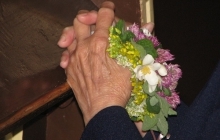Ram means the radiance within us; the light of the Self. The word 'Ravi' also means the same. 'Ra' means light, 'vi' means special. It means this special light within us that is eternal. The light in our heart is called Ram. So the light of our soul is Ram. This day of 'Ram Navami' celebrates the birth of this Divine inner light.
Lord Rama was born to King Dashrath and Queen Kaushalya. Kaushalya means skill, and Dashrath means one who has ten chariots. Our body has ten organs – Panch Jnanendriya (referring to the five senses) and Panch karmendriya (referring to the five senses associated with action, that is the two hands, two legs, the genitals, the excretory organ and the mouth). Sumitra means the one who is friendly with everybody. Kaikeyi means one who is always giving selflessly to everyone.
So King Dashrath along with his three wives went to the Rishis (holy sages). When the Rishis gave them Prasad (food given after being offered to the Divine) then by its divine grace, Lord Rama was born. Ram means inner light, and Lakshmana (Lord Rama's younger brother) means awareness. Shatrughana means one who has no enemies, or one who faces no opposition. Bharat means the talented one. Ayodhya (Lord Rama's place of birth) is one which should not be destroyed. The essence of the story is this: Our body is Ayodhya, the king of our body is the five sense organs and the five organs of action. The queen of the body is skill (Kaushalya). All our senses are outwards, with the use of skill we bring those inwards, and that is when the divine eternal light, which is Lord Rama, dawns within us.
So Lord Rama was born on Navami (in Hindu astronomy, referring to the ninth day). I shall narrate the significance of the ninth day some other time.
When the mind (Sita) was kidnapped by ego (Ravana), then both the divine light together with the awareness (Lakshmana) brought her back home, on the shoulders of Lord Hanuman (signifying Prana). This Ramayana keeps on happening in our body all the time.






